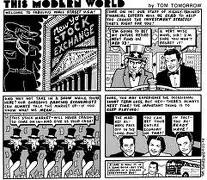Speaking of recession, a report in DAWN hints more than 100 businessmen, including over a dozen textile tycoons, fear bankruptcy from cross-currency transactions with foreign banks, carried out with the approval of State Bank of Pakistan to escape the impact of rising interest rate on rupee loans.
Sabihuddin Ghausi reports that businessmen were tempted to swap their rupee accounts with dollars mainly because State Bank policies had pushed interest rates on bank loans to new heights that were making an impact on their production costs.


It was the SBP that showed a way out from this situation under Financial Derivatives Business Regulation. Under this regulation, the central bank set a criterion for the businesses after compliance of which an account-holder in Pakistan rupee against a sanctioned loan was allowed to swap it with a dollar loan.


The dollar loan was subjected to LIBOR plus one per cent interest, which when dollar was worth Rs60 and interest rate was KIBOR plus four or five per cent, was found to be much more attractive.


The SBP issued regulation in late 2004 but foreign banks in Pakistan and businessmen speak of one particular foreign bank, which started an aggressive marketing campaign of the product designed under this regulation after June 2007. Their suspicion is that the bank which lured them into loan swapping has some information about the steep fall in exchange value of rupee that has brought them windfall gains. This particular foreign bank is involved in about 80 per cent of cross-currency transaction deals with businesses and is mounting pressure for recovery of its dues.


“Our offices were literally swarmed with smart boys and girls of these foreign banks every day who convinced us of immense benefits available under loan swapping business,” a tycoon who confessed that “we were tempted into business as Samad Dadabhoy did about 20 years ago with several middle class savers.”
Leaders of four top textile groups met this week with senior directors of the SBP to seek redressal of their problem. However, SBP officials expressed their helplessness on the plea that every transaction was processed and was authorised by the SBP after it was found to be complying with the criteria set in Financial Derivatives Regulation for swapping of loans issued in the year 2004.
Top business houses are already meeting leading local lawyers and are exploring option of engaging foreign legal consultants to fight cases against the foreign banks.
Sabihuddin Ghausi reports that businessmen were tempted to swap their rupee accounts with dollars mainly because State Bank policies had pushed interest rates on bank loans to new heights that were making an impact on their production costs.


It was the SBP that showed a way out from this situation under Financial Derivatives Business Regulation. Under this regulation, the central bank set a criterion for the businesses after compliance of which an account-holder in Pakistan rupee against a sanctioned loan was allowed to swap it with a dollar loan.


The dollar loan was subjected to LIBOR plus one per cent interest, which when dollar was worth Rs60 and interest rate was KIBOR plus four or five per cent, was found to be much more attractive.


The SBP issued regulation in late 2004 but foreign banks in Pakistan and businessmen speak of one particular foreign bank, which started an aggressive marketing campaign of the product designed under this regulation after June 2007. Their suspicion is that the bank which lured them into loan swapping has some information about the steep fall in exchange value of rupee that has brought them windfall gains. This particular foreign bank is involved in about 80 per cent of cross-currency transaction deals with businesses and is mounting pressure for recovery of its dues.


“Our offices were literally swarmed with smart boys and girls of these foreign banks every day who convinced us of immense benefits available under loan swapping business,” a tycoon who confessed that “we were tempted into business as Samad Dadabhoy did about 20 years ago with several middle class savers.”
businessmen fear bankruptcy video
Leaders of four top textile groups met this week with senior directors of the SBP to seek redressal of their problem. However, SBP officials expressed their helplessness on the plea that every transaction was processed and was authorised by the SBP after it was found to be complying with the criteria set in Financial Derivatives Regulation for swapping of loans issued in the year 2004.
Top business houses are already meeting leading local lawyers and are exploring option of engaging foreign legal consultants to fight cases against the foreign banks.
businessmen fear bankruptcy video-2


No comments:
Post a Comment